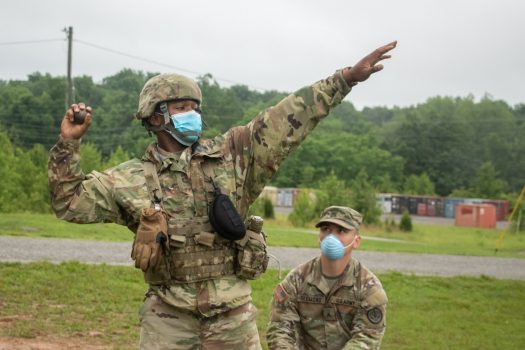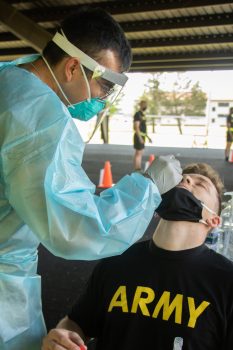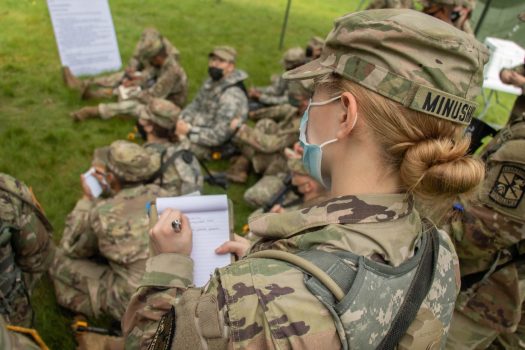By: Amy Turner and Kyle Crawford
Fort Knox KY — Despite an unprecedented past year and a half, Cadet Summer Training (CST) is well underway training future U.S. Army officers.
COVID-19 precautions have been put into place such as requiring Cadets to wear masks for a 10-day monitoring period. Cadets will also be tested upon their arrival to Fort Knox. Before exiting the 10-day monitoring period, pool testing methods are used. Pool testing is a method that tests various Cadets from groups composed of the people that interact most closely together. If a certain group has multiple people testing positive then more testing will be done.

Training is not stopped for those testing positive. Cadets who test positive are moved from their regiment into the COVID Recovery Element (CRE). The CRE is a separate housing area to house individuals during their quarantine period before they can rejoin the CST training schedule.
Once a Cadet or Cadre member either tests positive or is determined to have close exposure they are brought to the CRE which is comprised of two barracks. People who test positive are placed into a 10-day isolation period in the CRE. Once they are released, they will continue to be closely monitored for another four days while reintegrating with a regiment. Those who have been exposed to the COVID-19 virus are held for a 14-day quarantine in the CRE. Individuals will receive daily care from the CRE team and medical personnel.
Executive Officer of the CRE, Maj. Karlene Wright, says the CRE team plays a necessary role in preventing the spread of COVID-19 at CST.
“It is important that we identify a team that can immediately take action if someone does become positive and isolate them from any other individual to minimize the outbreak and take control of that command or element until it is safe for them to go back out into their regiment,” Wright said.

The CRE provides three meals a day, training resources and recreational activities as well as access to the internet.
Wright stated that many Cadets and Cadre members arriving at the CRE are disappointed to be leaving the normal CST training, but leave recovered and ready to train.
“We try to make them feel as normal as possible,” Wright said. “…Success is that Cadets leave here happy and ready to train with no setbacks.”
To date, no Cadets have been sent home due to a positive COVID-19 test or related issues.
Already some of the Cadets from 1st Regiment, Advanced Camp, have successfully been discharged from the CRE and are back on the ground training. Each regiment’s leadership will develop a training plan to catch up these Cadets based on the medic’s recommendation. Each Cadet will be reintegrated based on their training history and with a focus on preparing everyone for must-pass events such as the Occupational Physical Assessment Test (OPAT), Weapons Qualification and Field Training Exercises (FTXs).
1st Regiment’s Regimental Training Officer, Lt. Col. Mark McClellan, has worked with integrating Cadets from CRE back into training.
“They are still with their peers, they are still integrated with their squads and platoons, they are still executing leadership positions, we are still evaluating them for leader attributes…” McClellan said. “That four day period really didn’t hold them back.”
Regardless of a positive COVID-19 test, Wright says to remember the safety protocols in place.
“We have learned that the masks work, social distancing works, using hand sanitizer and hand washing do work, it will definitely decrease the risks,” Wright said.

Those who have tested positive up to 90 days before their arrival to camp are asked to bring documentation from their testing. Documentation should include their name and the date of their positive test to avoid being placed in a 10-day isolation in accordance with the CDC guidelines.
Regardless of the new challenges the pandemic has presented, CST Commandant, Col. Brent Clemmer says that the priority for CST 2021 is that Cadets are trained for their future careers as U.S. Army officers.
“Our priority for this CST is to provide absolutely great training for you,” Clemmer said. “We will use your performance in that training to assess you against all the other Cadets in the nation.”
For more information about Cadet Summer Training and updates on COVID-19 visit #CST2021.




